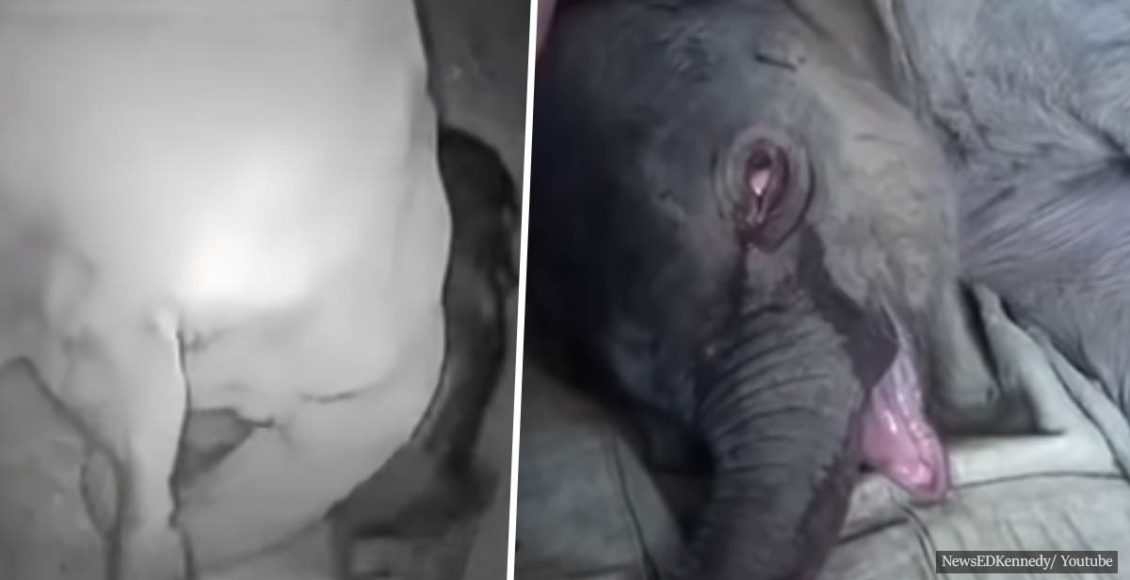Seven years ago a beautiful baby elephant named Zhuang Zhuang was born at the Shendiaoshan wildlife reserve in Rong-cheng, China.
Unfortunately, he was instantly rejected by the mother, who even tried to stamp him to death.
When it happened, zookeepers believed it was just an accident, so they took Zhuang out, tended to his injuries and brought him back to his mother only to see him attacked by her in a vicious manner again.
Babies are more often rejected while in captivity than in the wilderness because the mother does not have the necessary support provided by her natural habitat.
Once again, zookeepers had to intervene, saving Zhuang’s life.
However, they could not protect him from emotional trauma, as he cried uncontrollably for a period of five hours after the incident.
“The calf was very upset and he was crying for five hours before he could be consoled,” a zoo employee told Metro UK. “He couldn’t bear to be parted from his mother and it was his mother who was trying to kill him.”
And, of course, this begs the question: what is the cause of all this? Why did this mother push her child away in such a cruel way?
“As elephants are so tactile and sociable, a mother rejecting their newborn appears very unusual,” the Daily Mail writes. “Typically, an expecting mother will seek out another female elephant in her herd who will help her when she gives birth and offer her protection.” So, what happened?
Elephant advocate Julia S. Ferdinand, and Andrea Worthington, who has a P.h.D. in Zoology and Ecology, explain what some of the causes of this behavior are:
Ferdinand writes, “In the wild in an elephant herd, all the members of the herd grow up caring for all of the younger calves. They effectively learn to parent with the support of their aunts, sisters and the matriarch.”
“When a calf is born, the mother is surrounded by her female relatives, but she will choose a special ‘auntie’ to help her give birth. The auntie and the other members of the herd assist the mother, but they also pay special attention to the calf. If this is a first-time mother, she may be scared and due to the pain involved in the birth, it is possible the inexperienced mother will attack or hurt the baby, intentionally or unintentionally. The aunties will take the new calf away from the mother allowing her to recover from the pain and slowly be introduced to her new calf. In the wild, it is highly unlikely that a mother would reject her calf as the aunties provide support and assistance to help her accept the baby. Even severely ill or physically injured calves are seldom rejected unless the mother sees there is no hope in saving it.”
“In captivity, female elephants do not have the support of the aunties, instead, humans take the place to provide care. The mother may not grow up learning how to care for younger [elephants] and may be very inexperienced. The human attendants will take the calf away from her as soon as it’s born to allow the mother time to decompress and get over the pain and to assess the health of the baby, similar to when a human gives birth in the hospital.
Though there are cases where inexperienced human handlers have not taken the calf away and the mother elephant is so frightened by the pain and sight of an unfamiliar baby that she will try to harm the calf or reject it. Calves are more often rejected in captivity than in the wild, because the mother lacks the support that is part of elephant natural behavior, Ferdinand surmises”
In a nutshell, “living in captivity outside of traditional family groups can interfere with animals’ protective instincts towards their young.” And it seems that this is precisely what might have happened to little Zhuang Zhuang.
Thankfully, Zhuang had a caring team of people at Shendioshan wildlife reserve who managed to give him the love and attention he needed to survive. It is said that he is now healthy and well.
What are your thoughts on this tragic situation? Let us know by joining the conversation in the comments, and please share this article if you’ve found it informative.



